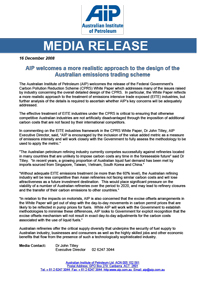AIP welcomes a more realistic approach to the design of the Australian emissions trading scheme
The Australian Institute of Petroleum (AIP) welcomes the release of the Federal Government's Carbon Pollution Reduction Scheme (CPRS) White Paper which addresses many of the issues raised by industry concerning the overall detailed design of the CPRS. In particular, the White Paper reflects a more realistic approach to the treatment of emissions intensive trade exposed (EITE) industries, but further analysis of the details is required to ascertain whether AIP's key concerns will be adequately addressed.
The effective treatment of EITE industries under the CPRS is critical to ensuring that otherwise competitive Australian industries are not artificially disadvantaged through the imposition of additional carbon costs that are not faced by their international competitors.
In commenting on the EITE industries framework in the CPRS White Paper, Dr John Tilley, AIP Executive Director, said, "AIP is encouraged by the inclusion of the value added metric as a measure of emissions intensity and will work closely with the Government to fully assess the methodology to be used to apply the metric."
"The Australian petroleum refining industry currently competes successfully against refineries located in many countries that are unlikely to impose carbon costs any time in the foreseeable future" said Dr Tilley. "In recent years, a growing proportion of Australian liquid fuel demand has been met by imports sourced from Singapore, Taiwan, Vietnam, South Korea and China."
"Without adequate EITE emissions treatment (ie more than the 60% level), the Australian refining industry will be less competitive than Asian refineries not facing similar carbon costs and will lose attractiveness as a future investment destination. This would place significant pressure on the viability of a number of Australian refineries over the period to 2020, and may lead to refinery closures and the transfer of their carbon emissions to other countries."
"In relation to the impacts on motorists, AIP is also concerned that the excise offsets arrangements in the White Paper will get out of step with the day-to-day movements in carbon permit prices that are likely to be reflected in pump prices for fuels. While AIP will work with the Government to establish methodologies to minimise these differences, AIP looks to Government for explicit recognition that the excise offsets mechanism will not result in exact day-to-day adjustments for the carbon costs associated with the use of liquid fuels."
Australian refineries offer the critical supply diversity that underpins the security of fuel supply to Australian industry, businesses and consumers as well as the highly skilled jobs and other economic benefits that flow from the presence of such a technologically sophisticated industry.
Media Contact:
Dr John Tilley
Executive Director, AIP
(02) 6247 3044
